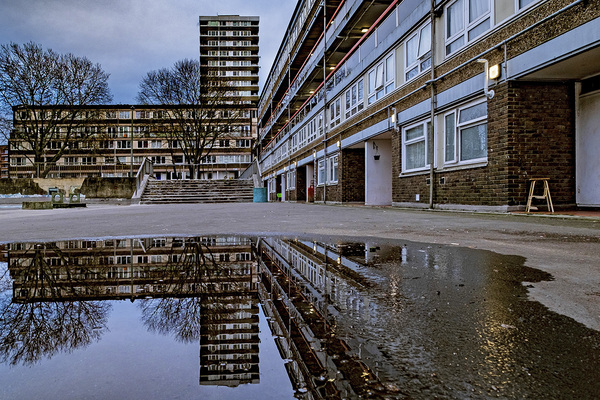You are viewing 1 of your 1 free articles
In full: Terrie Alafat’s opening address to Housing 2019
The full text of the speech given by the Chartered Institute of Housing (CIH) chief executive Terrie Alafat to open Housing 2019
“Good morning everyone and welcome to Housing 2019.
Once again, we find ourselves coming together in uncertain times.
Right now we do not even know who the next prime minister will be – let alone what the UK is going to look like in the months and years ahead.
Brexit has revealed just how fundamentally divided our country has become.
Every week I see bleaker reports; people say our political system is broken and see our country as split by age, class, geography – and of course Brexit. And most worryingly, it is our younger people who seem most pessimistic about the future – their future.
And very clearly our housing system is failing all of us. It is not delivering what it should. And that’s more than just homes – it is communities where people want to raise a family, it is vibrant places where people have jobs and the services they need to prosper and thrive.
Housing has the power to heal the divisions that risk breaking our whole nation apart.
And Brexit has so dominated the political agenda that there is a real risk of housing, along with other crucial issues, being squeezed out.
We cannot allow that to happen. We cannot afford to take our eye off the ball. We may not realise the full impact of Brexit for years, but we can see the effects of our national housing crisis today, and tomorrow is looking depressingly familiar:
- Millions of people will find it more and more difficult to find a safe, affordable place to call home
- Homelessness will rise
- Our health and social care services will be stretched to breaking point and beyond
If we do not deal with this now, our children and grandchildren will be paying the price – social as well as economic – for generations to come.
And with or without Brexit, we must also consider the potential impact of the next economic downturn.
So yes, we are facing tremendous political and economic uncertainty. Yes, we know the challenges. But as housing professionals, we also know many of the solutions.
There is plenty we can do now. I am talking about getting the basics right:
- Providing good-quality, genuinely affordable homes
- Making sure that our homes are safe
- Truly listening to – and acting on – the views of the people and communities we serve
- Making sure the homes we already have are as good as the best of the new ones we are building now
- Looking beyond just providing homes to being the anchor, the bedrock, of successful communities
We are not just about providing ‘housing’, we are about giving life chances – education, employment and well-being – to individuals, each with their own needs and their own dreams.
As in previous years, ahead of this week’s conference we asked Ipsos Mori to ask some questions about housing. The people they asked were a representative sample of the UK.
The thing that most struck me, after all I’ve said about Brexit, was that more and more people are concerned about the rising cost of housing: 75% of those who rent their home are worried about their housing costs, only 50% are worried about Brexit!
“Brexit has so dominated the political agenda that there is a real risk of housing, along with other crucial issues, being squeezed out”
This is hardly surprising, given more than a quarter of everyone asked were worried about paying their rent or mortgage now and they saw no prospect of things improving in the next 12 months.
More than 60% said they never expected to be able to buy a home of their own, while 20% said they doubted they would even be able to afford a home to rent.
Given these results, I am sure no one in this room will be surprised to hear me repeat that the fundamental issue is a chronic shortage of genuinely affordable housing. To truly tackle the housing crisis, we need to make sure we are building the right homes, in the right places, at the right prices.
For many people on lower incomes, the only genuinely affordable option is a home for social rent.
And from our own Rethinking Social Housing report to Shelter’s commission on the ‘future of social housing’, there is a growing consensus that building more homes for social rent must be at the heart of any government plans to solve the housing crisis. The time has come to reclaim social housing as a pillar of the society we want to be, along with universal health care, education and the welfare state.
We are approaching a comprehensive Spending Review in the autumn. Here is a golden opportunity for ministers to make the ambitious changes on housing which could start to make a real difference.
For this Spending Review, CIH, National Housing Federation, Shelter, Crisis and CPRE [Campaign to Protect Rural England] have come together to make clear what the government needs to do to end the housing crisis in England.
What we are calling for is a 10-year programme to build around one and a half million social homes to rent, as well as shared ownership properties to buy across the country. This would cost £12.8bn per year and would take spending levels back to those under Winston Churchill in the early 1950s.
Housing organisations stand ready to more than match this level of government investment through contributions from their own resources and by securing additional private borrowing. So every pound of government investment will unlock more than a pound of matching funding.
And that programme would add an additional £120bn to the economy each year through the creation of local jobs in construction and other industries. Effectively, every pound spent will boost the economy by more than eight times that amount in a balanced and sustainable way.
And it isn’t all about new money. Government investment is still heavily skewed towards the private market. Our analysis shows for the next four years, 79% of the housing budget is directed towards private housing, leaving just 21% for affordable housing. Rebalancing that budget would make a huge difference.
Last year the government paid £22.3bn in housing benefit, a significant proportion of which went to help millions of low-income tenants living in the private rented sector. CIH has calculated that for every 10,000 new social rented homes we build, the savings to the housing benefit bill are around £25m a year. Our proposed programme of 90,000 new social homes a year could save around £225m of housing benefit in the first year alone.
In the long run, investing in social housing offers great value for money.
The housing crisis is an economic, social and human catastrophe. But it can be solved. There is a solution – a solution that would add billions to our national economy and help millions of our fellow citizens.
Building new homes will be a critical part of any solution, but we also must stop losing those we have. More than 165,000 homes for social rent were lost in the last six years. That figure will reach 199,000 by 2020 if we do not act now.
I make no apologies for – once again – repeating our call for the Westminster government to suspend the Right to Buy in England. It is not good value and it is just not fair.
We strongly support aspiration. Through our work, we help tenants into jobs, into education, to raise healthy families and to develop safe and sustainable communities. And we support the aspiration of those tenants who want to become homeowners. We agree they should be helped to realise that aspiration, but that cannot be at the expense of millions of people languishing on our social housing waiting lists.
“The housing crisis is an economic, social and human catastrophe. But it can be solved”
Let’s put our money to better use. We should build many more homes for social rent but also look at fairer and more cost-effective ways to help tenants access homeownership. After all, Right to Buy isn’t the only show in town. Across the UK, councils and housing associations are developing new and innovative ways to help tenants into homeownership. More effective shared ownership, assisted savings and portable discounts – these can all help tenants realise their aspirations to become homeowners, often without the loss of social housing to the private sector.
And we also know that in the past a number of schemes have enabled thousands of households to buy a home without the damage created by Right to Buy. Remember the cash incentive scheme and the tenants’ incentive scheme? Both were highly successful, well liked and well understood and could make a contribution again if we wanted them to. Do-it-yourself shared ownership allowed people to buy the home they wanted on the open market and was equally popular.
There is more to supporting homeownership than just Right to Buy.
Unfortunately, welfare reform is also undermining our efforts to provide more affordable homes, because it is making life so much more difficult for those most in need.
Combine the benefit cap, the bedroom tax and the freeze on housing benefit for private renters, and it’s no surprise that homelessness in England has soared since 2009. Last Christmas, more than 124,000 children were stuck in temporary accommodation. That’s a disgrace, a shame on the nation that invented the welfare state.
The case for bold action could not be clearer. And, most urgently, it is time to lift the freeze on housing benefit for private renters and restore the link between Local Housing Allowance rates and actual rents. According to our research, in two-thirds of Scotland, 80% Wales and an unbelievable 97% of England the Local Housing Allowance covers not a third but barely a fifth of private rented homes.
This means that desperately stretched people are having to cut back on essential spending or are getting into debt and rent arrears. This significantly increases the risk of homelessness for many. It also makes it even more difficult for people who are homeless to find a home, with the private rental market just not an option and there is not enough social housing to go around.
It should go without saying that everyone should have access to a decent safe place to call home, and that renters should receive a fair, good-quality service from their landlord.
But for too many people this is not the case.
Two years ago we met here in Manchester shortly after one of the most horrific human tragedies any of us will ever witness. The horrendous events of Grenfell Tower were the very worst reminder that housing is all about people.
Two weeks ago, more than a year on from the Hackitt Review of building regulations and fire safety, the government published a consultation on its plans for building safety regulations.
We welcome the consultation. It is good to see more detail and clarity on the roles and responsibilities for fire safety and on the proposals to put residents at the heart of the new regulatory system. We will ask our members what they think will work in practice and make sure that it is reflected in our response to the consultation and in our conversations with government.
Of course, paying attention to the views of tenants is not just the government’s job. Every social landlord should always be striving to improve the way they listen to and engage with their tenants and residents.
These are their homes.
We at CIH are ready to help. Through sharing good practice and innovative ideas, we can help everyone be as good as the best – and then get better.
As I said right at the start: we know many of the answers to the challenges we are facing. And we’ve had quite a few success stories since we met this time last year.
Due in large part to the efforts of the entire housing sector, funding for supported housing rents will stay within the welfare system, giving much-needed certainty for current and future residents.
But there is unfinished business here: we still don’t have a sustainable plan for funding support services. This causes real problems for landlords and service providers and does not create an environment in which organisations will invest in new supported housing. But more importantly this chronic uncertainty should not be a feature of the lives of some of our most vulnerable fellow citizens.
Surely we can and must do better than this? This problem needs our and the government’s urgent attention.
But back to successes.
In England, the Housing Revenue Account borrowing cap has been scrapped, freeing up councils to build more affordable homes and play a much bigger role in tackling the housing crisis.
In the private rented sector, England is to follow Scotland’s example in scrapping Section 21 and ending so called ‘no-fault’ evictions.
“We still don’t have a sustainable plan for funding support services”
The long-awaited Homes (Fitness for Human Habitation) Act came into force earlier this year. A ban on letting agent fees and plans to regulate letting agents is in the pipeline, too. CIH has helped the government develop fresh guidance for local authorities on tackling rogue landlords.
Last month, we also joined with Inside Housing and a host of organisations to call on the government to end the scandal of dangerous cladding left on private tower blocks. Ministers quickly announced the government would fully fund the replacement of unsafe ACM [aluminium composite material] cladding on high-rise private residential properties where building owners have failed to do so.
In fact, we can see the impact of our work across the UK.
In Northern Ireland, where the role of social housing in communities could not be more important, the CIH has made recommendations for major change through its Rethinking Social Housing project. And, while around 90% of social housing in Northern Ireland remains segregated along religious lines, housing associations are in the vanguard of building the new shared neighbourhoods that people have repeatedly said they want.
In Wales, CIH has helped housing professionals play a significant role in shaping the landmark affordable housing review. We have also worked with local authorities and housing associations in Wales to show how support services can be better accessed and used by private landlords.
In Scotland, CIH has developed the first guidance on housing and domestic abuse. This will be launched in August with our partners. We have also developed advice on temporary accommodation standards which is being used by the Scottish government as the basis for statutory guidance.
And we plan to be just as influential in the future.
“Many landlords are currently rethinking their approach to housing management and the sector’s social purpose and whether we are still sufficiently focused on our existing tenants’ needs”
Our ‘Rethinking Allocations’ research has highlighted how important it is for the sector to provide homes to people who need them the most, but also to ensure tenancies are sustainable. We have always faced a trade-off between these competing objectives but given the shortage of homes it is becoming increasingly difficult to find a balance that works.
It is a catch-22 scenario – where the reasons why people most need access to social rented homes are often the very reasons why they face challenges in the allocation process. We found that allocation processes driven by a tick-box approach fail to recognise people as individuals and therefore risk locking out the very people we aim to help.
Many landlords are currently rethinking their approach to housing management and the sector’s social purpose and whether we are still sufficiently focused on our existing tenants’ needs. The roll-out of Universal Credit and the use of technology to support more mobile and more agile working asks questions about how we manage our housing.
We want to understand what these new approaches to housing management look like in practice, what evidence there is of how well they are working and what practical challenges there are in adopting new approaches. We will be carrying out research over the summer and publishing a report on new approaches to housing management in the autumn.
The jobs you do and the decisions you take every day have a huge impact on people’s lives.
That is why being a housing professional is so important. We all know how crucial it is to have the right knowledge and skills to do our jobs, but that is not enough when the work we do means so much to people’s futures. We also need the right behaviours, values and ethics to allow us to make the right decisions and to earn and maintain the trust of the tenants and communities we serve.
Housing is fast-moving and challenging, so we need to stay up to date. As professionals, it’s important we learn from our mistakes and the success of others, sharing our knowledge and investing in our development.
And most importantly we need to look, think and listen outside the housing bubble.
We need to get the big picture.
We need to take the long view.
Only that way can we play our full part in healing our divided society.
But none of this just happens. We all need to work at it, every day. And that is where CIH, as the professional body for housing, comes into play.
We support you as housing professionals throughout your careers so that you can provide best services for the people and communities you serve.
At CIH we are working every day to improve, too. We are creating a comprehensive standards framework to be the hallmark of professionalism in housing.
On our CIH stand this week, we will be highlighting how proud we all are to be professional. Join us, take a selfie and post why you are proud to be professional on our wall of fame.
We must remember how privileged we are to work in a profession where we have a chance to make a real difference to people and communities all over the UK every single day of our working lives. And we should take pride in doing what we do as well as we possibly can.
To inspire us all, here is a short film where people working in housing tell us what it means for them to be a professional and why they’re proud of what they do.
I’m proud to be professional. You should be, too.”
Terrie Alafat, chief executive, Chartered Institute of Housing speaking on the first day of Housing 2019, 25 June 2019.
More from Housing 2019
What’s happening at Housing 2019?
Dispatches from Housing 2019 – Thursday Our round-up of the third and final day
Whatever Theresa May says, social housing is still the victim of a focus on homeownership Editor Martin Hilditch gives Inside Housing’s verdict to the prime minister’s speech
Your Housing 2019 tweets: a selection of tweets from the conference
Theresa May believes in a change of direction – but will Johnson or Hunt pay any attention? Jules Birch gives his take on Theresa May’s speech to Housing 2019
Watch Theresa May’s speech: a video of the prime minister’s speech to Housing 2019 in full
Dispatches from Housing 2019 – Wednesday The key takeaways from day two of the conference and exhibition
John Healey on Grenfell, Boris Johnson and Labour housing policy Ahead of his speech to Housing 2019, the shadow housing secretary takes part in a Q&A with Inside Housing
Dispatches from Housing 2019 – Tuesday Our round-up of all the key talking points in Manchester on the first day of the conference
Housing Heroes 2019 winners announced Find out the 17 winners and 14 commendations at the ceremony on Monday ahead of the conference and exhibition
In full: Terrie Alafat’s opening address to Housing 2019 The full text of the speech given by the chief executive of the Chartered Institute of Housing to open Housing 2019
What will the Hackitt Review changes mean for you? Conference speaker Debbie Larner writes for Inside Housing about building safety
Inside Housing and Aico competition: tell us about your resident safety campaign We launch a new competition to promote fire and carbon monoxide safety
The latest news headlines from the conference:
Next PM will be committed to social housing, says Brokenshire
Homes England strategic partners to get £1bn cash boost
John Healey blasts May's housing record
Don't wait for Hackitt legislation to push ahead with building safety, says MHCLG official
Theresa May: ‘social housing a victim of drive for homeownership’
‘No-deal Brexit an opportunity for housing’, claim sector figures
Banks’ appetite to lend threatens offsite take-up, warns major landlord
Minister: funding allocations should be based on joint-agency working
Sector warned that fire safety costs could eat up HRA cap windfall
Theresa May to give speech at Housing 2019 conference
Regulator ‘found no breaches’ following Dispatches programme on Sanctuary
No funding for removal of combustible balconies, says Malthouse
MHCLG housing supply chief: affordable housing grant increase ‘on the table’ for Spending Review
‘We have got to do the right thing’ on affordable housing, says land director of Homes England
Council boss warns against local authority ‘can’t do’ attitude towards housebuilding
Terrie Alafat says Spending Review must ‘make a real difference’
Sector needs £146bn from government over a decade to end housing crisis, says NHF
Savills housing sector survey: building homes more important than existing stock to housing leaders
Morning Briefing: thousands descend on Manchester for Housing 2019
We are bringing you the most up-to-date, comprehensive coverage of #CIHHousing anywhere, including:
— Inside Housing (@insidehousing)
All the biggest #ukhousing stories
Live tweeting from the key sessions
A daily newsletter rounding up the key talking points
Daily magazines of conference newsWe are bringing you the most up-to-date, comprehensive coverage of #CIHHousing anywhere, including:
— Inside Housing (@insidehousing) June 26, 2019
All the biggest #ukhousing stories
Live tweeting from the key sessions
A daily newsletter rounding up the key talking points
Daily magazines of conference news













